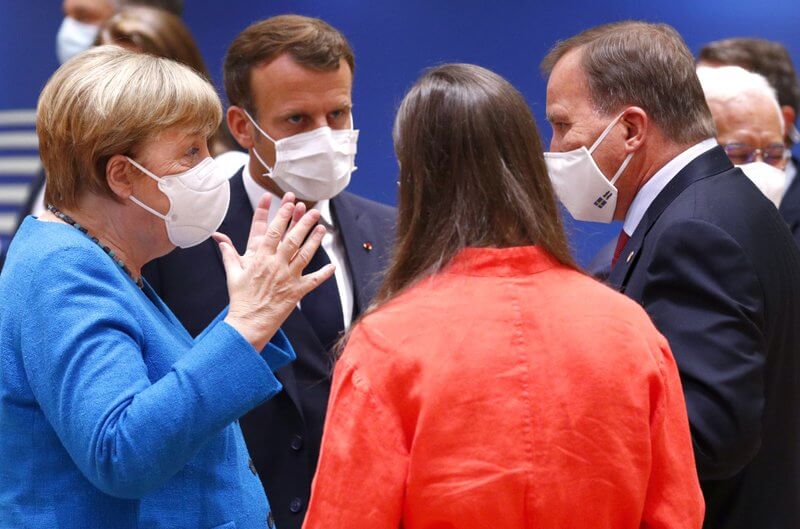On Saturday, German Chancellor Angela Merkel, French President Emmanuel Macron, and Italian Prime Minister Giuseppe Conte published a joint statement on Libya at a meeting that was called to discuss the European Union’s (EU) post-COVID recovery plan in Brussels. The statement said that Libya was facing a “heightened risk of regional escalation”, and urged the international community to refrain from any violent activities or support to such acts in Libya. They also called on international actors in the region to “end their increasing interference and to fully respect the arms embargo established by the United Nations Security Council”.
For the first time, the EU leaders spoke of the possibility of imposing sanctions against those who disregarded the arms embargo in Libya. The statement read: “We are ready to consider the possible use of sanctions should breaches to the embargo at sea, on land or in the air continue.”
They added: “We share serious concerns about the mounting military tensions in this country and the increased risk of regional escalation … We therefore call on all the Libyan parties and their foreign supporters to immediately cease the fighting and put an end to the ongoing military escalation across the country.”
Last week, at the first in-person meeting between the foreign ministers of the European Union (EU) since the COVID-19 outbreak, Turkey’s actions over the past few months were the central focus. There was broad consensus on discontent over two matters—the Hagia Sophia issue, and Ankara’s “unilateral” actions in the Eastern Mediterranean. At the meeting, Josep Borrell, the EU’s Foreign Affairs Chief, expressed concerns over Turkey’s actions in Libya, which the European bloc believes violates the arms embargo in place.
These latest statements by European leaders come amidst an ongoing war of words between France and Turkey, which began in early June. This was primarily instigated by an incident on June 10, when Turkish frigates, which were accompanied by a cargo ship, refused to be inspected by French frigates, who were working on the NATO Sea Guardian Operation. France claims that the cargo was involved in trafficking arms into Libya, while Turkey maintains that it was carrying medical supplies for humanitarian aid.
Libya has been a hotbed of violence since the deposition and assassination of Muammar Gaddafi in 2011 by NATO-backed forces. Currently, the country has two rival administrations vying for control—the UN-backed Government of National Accord (GNA) and the Libyan National Army (LNA) headed by Field Marshal Khalifa Haftar. The LNA launched an offensive in April 2019. According to the United Nations, over 2000 fighters and 280 civilians have been killed since the beginning of Haftar’s blockade.
The UN-backed GNA has been supported by Turkey ever since Recep Tayyip Erdoğan and Libyan Prime Minister Fayez al-Serraj struck a controversial deal in November 2019, in which they agreed to cooperate militarily and strategically in the Mediterranean. Turkey assisted the GNA to help secure Tripoli and the western regions of the country against the threat it faced by Haftar’s LNA. Turkey has allegedly increased its involvement in Libya over the past few weeks by providing military and arms support to the GNA.
On the other hand, Haftar has the support of Turkey’s regional rivals, the United Arab Emirates (UAE) and Egypt, along with Russia and France. Previously, France provided Haftar’s army with military support against the growing influence of Islamist militants in the region. While France’s official stand has never been outrightly in favour of Haftar’s army, its hypocrisy on the situation is apparent. It has time and again defended other state actors who supported the LNA in Libya. For instance, speaking on Egyptian interference in the conflict, Macon said that Egypt had the right to intervene as they faced a genuine threat from the unrest in Libya. Further, Macron also conveniently steers away from any comment on Russian presence in Libya. He said, “Russia doesn’t claim to be intervening in Libya … Turkey claims it – it is its official boats, military, its policy.”
Libyan Conflict Coverage:
- Macron Accuses Turkey of Bearing Criminal Responsibility for its Actions in Libya
- Russian Mercenaries Evacuate Libya, US Accuses Moscow of Sending Warplanes to Haftar
- Libya Calls for US and EU Blockade on Russian Mercenaries as They Enter Oil Fields
- Turkey Threatens Retaliation against Haftar’s Forces in Libya as Tensions Escalate
- Libyan Rivals Set to Sign a Ceasefire Agreement in Moscow
- After Year-Long Offensive, UN-Recognized Government Regains Control of Libyan Capital
- Turkey Announces the Deployment of Troops to Libya
- France Withdraws From NATO Operation Following Spat With Turkey
- EU Foreign Ministers Call for Action Against Turkey and China

